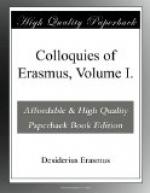This last work of the Colloquies, with the addition of an appendix, is issued in the month of September, 1524._
[Footnote A: Gallus: meaning also a Cock.]
[Footnote B: Immunis instead of immune agreeing with Londinum.]
* * * * *
From a letter of Erasmus dated 5th Oct. 1532, we gather some further particulars about the obnoxious person above referred to. His name was Lambert Campester. Subsequently to his exploit at Paris in printing a garbled edition of the Colloquies, he “fled to Leyden; and pretending to be a great friend of Erasmus, found a patron, from whom having soon stolen 300 crowns, fled, was taken in his flight amongst some girls, and would have been nailed to a cross, had not his sacred Dominican cowl saved him. He, I say, many other offences and crimes having been proved against him, is at length in a certain town of Germany, called, I think, Zorst, in the Duchy of Juliers,—his cowl thrown aside, teaching the Gospel, that is, mere sedition. The Duke begged them to turn the fellow out. They answered that they could not do without their preacher. And this sort of plague spreads from day to day."
#ERASMUS ROTERODAMUS# TO THE DIVINES OF LOUVAIN,
His dearly beloved brethren in the Lord, greeting.
A matter has been brought to my knowledge, not only by rumour, but by the letters of trustworthy friends, expressly stating in what words, in what place, a calumny was directed against me in our midst, through the agency of a well-known person, who is ever true to himself; whose very character and former doings lead one to assume as ascertained fact what in another would have been but probable. Accordingly, I thought I ought to make no concealment of the matter; especially from you, whose part it was to restrain the unbridled impudence of the fellow, if not for my sake, at all events for that of your Order.
He boasts and vociferates that in the book of Colloquies there are four passages more than heretical: concerning the Eating of meats and Fasting, concerning Indulgences, and concerning Vows, Although such be his bold and impudent assertion, whoever reads the book in its entirety will find the facts to be otherwise. If, however, leisure be wanting for the reading of trifles of this description, I will briefly lay the matter open. But before I approach it, I think well to make three prefatory remarks.
First, in this matter contempt of the Emperor’s edict[C] cannot be laid to my charge. For I understand it was published May 6th, 1522, whereas this book was printed long before: and that at Basle, where no Imperial edict had up to the time been made known, whether publicly or privately.
[Footnote C: Edict of the Emperor Charles V.: 1523.]




